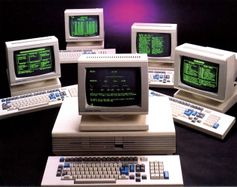Fortune 32:16
| Branding | Fortune Systems |
|---|---|
| Manufacturer | Fortune Systems |
| Layouts | Domain specific |
| Keyswitches | Key Tronic foam and foil, Digitran capacitive leaf |
| Keycaps | Double-shot injection molding ABS |
| Interface | 8P8C Modular Jack |
| Years of production | 1983-? |
| Discontinued | Yes |
Fortune 32:16 was a family of business computer systems produced by Fortune Systems in the 1980s. The systems used a Motorola 68000 microprocessor and ran the proprietary FOR:PRO operating system which was based on AT&T Unix.[1]
Contents
Layout
All Fortune 32:16 keyboards share a common layout using a standard QWERTY layout for the alphas. Above the alpha block is a row of 16 function keys. To the left of the alpha block are three symbol keys. To the right of the alpha block is a navigation cluster and number pad.
Variants
There are two variants of the Fortune 32:16 keyboard; the HTS with Digitran capacitive leaf switches and the STS with Key Tronic foam and foil switches. From the 1987 Fortune Systems 32:16 Field Service Manual[1]:
"There are actually two types of top covers on the 32:16 models, the Soft Tooled Skin (STS) and the Hard Tooled Skin (HTS). The difference is that the STS are painted and the HTS have the color and texture molded into the plastic. The way to determine an HTS CPU or Keyboard from an STS CPU or Keyboard is to measure the length. The HTS CPU or Keyboard is twenty-three inches long and the STS CPU or Keyboard is twenty-two inches long.[1]"
HTS Digitran
STS Key Tronic
Gallery
Interfacing
The Fortune 32:16 keyboards use 8P8C module jacks.
Pinout
Pin Function 1 Ground 2 Serial Data 3 Unknown 4 VCC +5V 5 VCC +5V 6 Ground 7 Sheild 8 Sheild
Protocol
Data is sent as 2400 baud, asynchronous serial data using 1 start bit, 8 data bits and 1 stop bit (8N1). No parity bit is used. The polarity of the line is inverted (active low), i.e a bit value of 1 is indicated by a low voltage level on the line. Keys send data on key press but not on key release. The Control, Shift and Caps Lock keys send no data when pressed. The alpha block sends a single byte ASCII value corresponding to their legends and modifier combination. For example, the 'A' key sends ASCII 'a' (0x61) when pressed alone, ASCII 'A' (0x41) when pressed in combination with Shift or Caps Lock, and ASCII Ctrl-A (0x01) when pressed in combination with Control. All keys outside the alpha block send three bytes of data. The first byte is always Ctrl-A (0x01). The second byte indicates the key pressed. The third byte is Carriage Return (0x0D). Each such key has two possible values for the second byte; one when pressed alone and another when pressed in combination with Shift or Caps Lock.
Key codes
All codes sent are shown in the diagram below:

